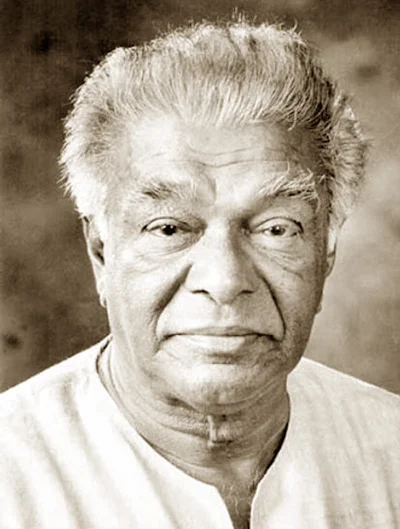Midweek Review
Mother of all challenges faced by SLPP!
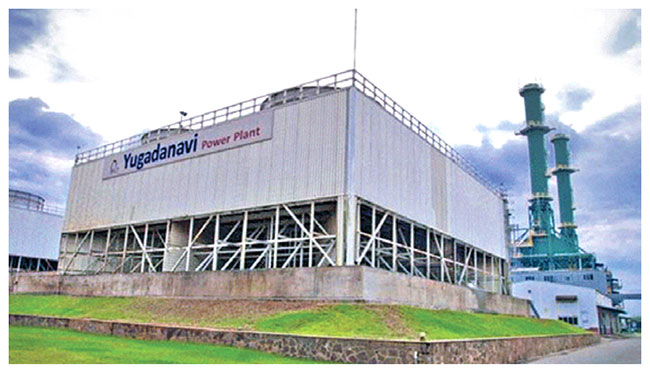
Yugadanavi legal wrangle:
By Shamindra Ferdinando
The Sri Lanka Podujana Peramuna (SLPP) government faces an overwhelming challenge from within, at the beginning of the New Year. The continuing dispute between the SLPP and a section of its constituent parties is threatening to overwhelm the ruling coalition over the backdoor offer by the New York-based US Company to purchase a 40 percent stake in Yugadanavi Power Plant, along with an almost monopoly status to supply LNG.
The SLPP appeared to have been caught off guard by three ministers, Vasudeva Nanayakkara (General Secretary, Democratic Left Front), Wimal Weerawansa (Leader, the National Freedom Front) and Attorney-at-Law Udaya Gammanpila (Leader, the Pivithuru Hela Urumaya), throwing their weight behind petitions against the deal. The three constituents have eight lawmakers in Parliament.
The Supreme Court will resume hearing the Fundamental Rights petitions challenging the Yugadanavi-related deals in the second week of January. A fuller bench of the SC heard those petitions on Dec 16 and 17, 2021. The next hearing is set for January 10, 2022, before a five-judge-bench consisting of Chief Justice Jayantha Jayasuriya, Justice Buwaneka Aluwihare, Justice Priyantha Jayawardena, Justice Vijith Malalgoda and Justice L.T.B. Dehideniya.
The Yugadanavi hearing will resume a week before Parliament meets again, following the much-debated prorogation. The President resorted to a tactical move in the wake of Janatha Vimukthi Peramuna (JVP) leader Anura Kumara Dissanayake tabling the hither to secret Yugadanavi agreement. The JVPer delivered a knockout blow a few hours before the vote on the 2022 Budget on Dec 10 evening.
President Gotabaya Rajapaksa prorogued Parliament immediately after the House approved the 2022 Budget. The Parliament is scheduled to meet again on January 18. Whatever the outcome of the Yugadanavi case, it’ll deliver a debilitating setback to the ruling coalition, struggling on several fronts. However, the relations between the two groups, in the coalition, have deteriorated so much, the SLPP and the rebellious partners may not be in a position to resolve their differences, out of Court. And if the differences are irreconcilable within the SLPP, the breakup of the coalition may become inevitable, especially with other dissenters in its own ranks, smarting from the fact they did not get any Cabinet portfolios to use the opportunity to teach the ruling clique a lesson. But they may very well end up cutting their proverbial nose to spite the face. But since the rebels took a principled and not a spiteful stand on the issue, both the President and PM will likely treat the partner rebellion as a storm in a tea cup. Premier Mahinda Rajapaksa has already stated in public that the rebel coalition partners have a right to dissent.
The declaration that Attorney General Sanjay Rajaratnam, PC, wouldn’t appear for the three ministers supporting the challenge, however, underscored the crisis within the government. They have retained private Counsel.
In addition to Prime Minister Mahinda Rajapaksa, the Cabinet of Ministers, New Fortress Energy Inc., West Coast Power (Private) Limited, the Ceylon Electricity Board, the AG is a respondent in this case.
The case is heard in terms of Article 132(3) of the Constitution. The petitioners are Samagi Jana Balavegaya General Secretary Ranjith Madduma Bandara, former JVP Parliamentarians Sunil
Hadunneththi and Wasantha Samarasinghe, Archbishop of Colombo Malcolm Cardinal Ranjith, Ven. Elle Gunawansa Thera and Viduli Sevaka Sangamaya have moved the Supreme Court against the agreements between the government and New Fortress Energy Inc., in relation to the sale of 40% of the shares of Yugadanavi Power Plant, located at Kerawalapitiya.
The petitioners said on 7th of July 2021, the framework agreement was signed between the government of Sri Lanka and New Fortress Energy Inc., for the disposal of 40% of the total shares held by West Coast Power (Private) Limited in the Yugadanavi (Pvt) Ltd for USD 250 million. Critics have repeatedly pointed out that there was nothing wrong in selling the 40 percent stake for that amount, the problem lay in the fact that New Fortress was also getting a monopoly status to supply LNG, ostensibly for five years, at the beginning, but who knows what would happen later on once they get themselves entrenched here with the corrupt bureaucracy and politicians.
Earlier both the CEB and Telecom were wrangled in so many corrupt deals, especially involving certain French multi-nationals, but many of them were undone especially during the tenure of former Prime Minister Ranil Wickremesinghe in the 1990s. Such deals were a drain on the private sector-friendly UNP government. So finally Western lenders themselves told the French enough was enough. It was a case of French selling us outdated equipment and charging us premium prices to keep them going. For example in those days after each heavy downpour many telephone lines in the country would go dead, but luckily for us all that was corrected with the privatisation of Telecom by Minister Mangala Samaraweera and clipping of the wings of the then all-powerful trade union UPTO. It was a classic case of trapping them using their greed.
The petitioners said agreements had been further entered for the execution of the Terminal Project which includes Floating Storage Regasification Unit (FSRU), Mooring system and the Pipelines, and the supply of Liquefied Natural Gas (LNG) to West Coast Power (Pvt) Ltd.
They state that to the best of their knowledge, the Share Sales and Purchase Agreement (SSPA) pertaining for the sale of 40% of the shares in West Coast Power (Pvt) Ltd., and the Gas Supply Agreements have not been placed before the Cabinet of Ministers to date.
Bundling the contracts for the Liquefied Natural Gas (LNG) terminal, construction of pipelines and Liquefied Natural Gas (LNG) supply in a single unsolicited proposal and awarding them to a foreign-based company, without following a transparent procedure, poses a serious threat to the national energy security of the country, they point out.
They said the proposal to purchase 40% of the shares in the West Coast Power (Private) Limited is contrary to the National Energy Policy and Strategies.
Manohara and Romesh on
opposing sides
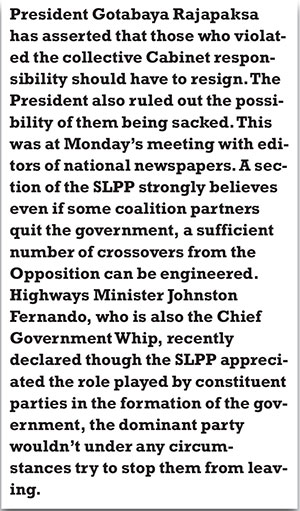 Perhaps, the top SLPP leadership believed the trio wouldn’t go the whole hog though they opposed the deal. However, following consultations among the rebel group, the DLF, NFF and PHU decided to challenge the Cabinet of ministers in the Supreme Court even at the risk of losing their ministerial portfolios. Their relationship with the dominant partner has been damaged severely. In fact, irreparable damage may have been caused.
Perhaps, the top SLPP leadership believed the trio wouldn’t go the whole hog though they opposed the deal. However, following consultations among the rebel group, the DLF, NFF and PHU decided to challenge the Cabinet of ministers in the Supreme Court even at the risk of losing their ministerial portfolios. Their relationship with the dominant partner has been damaged severely. In fact, irreparable damage may have been caused.
When the writer sought an explanation from Minister Gammanpila, one-time heavyweight of the Jathika Hela Urumaya (JHU), the lawmaker didn’t mince his words. “Whatever happens, we cannot remain committed to the so called collective responsibility of the Cabinet at the expense of national interest.
Dismissing the Attorney General’s stand vis-a-vis the defiant ministerial group, lawmaker Gammanpila declared that either those (three ministers) or the Attorney General had lied to the Supreme Court in respect of the Yugadanavi deal. Underscoring the fact that both represented the government, lawyer Gammanpila pointed out that in case the Supreme Court ruled one party furnished falsehood in an affidavit that party faced a three-year prison term.
The five-judge bench dismissed the Attorney General’s assertion that as the fundamental rights cases hadn’t been filed within the stipulated period, they should be dismissed. Having proposed to conduct proceedings on Dec 21 and 22 following hearings on Dec 16 and 17, judges put off the proceedings to January 10, 2022, on a request by the Attorney General. If not for the Attorney General’s plea, a lot more would have been in the public domain now.
Two of the country’s top lawyers, Manohara de Silva, PC and Romesh de Silva, PC, appeared for the opposing sides. Manohara, who openly campaigned against the yahapalana lot, appeared for petitioner Lanka Viduli Sevaka Sangamaya whereas Romesh represented respondent the Ceylon Electricity Board (CEB). The case has taken an unexpected turn with the disclosure of CEB Chairman M.C. Ferdinando’s controversial role in the whole process, particularly his endorsement of the agreement as an Advisor to the Finance Ministry. Ferdinando is the seventh among 73 respondents named in a petition filed by 12 persons represented by Manohara de Silva, PC. Interestingly, three Commissioners of the CIABOC (Commission to Investigate Allegations of Bribery or Corruption) are among the respondents.
What really made the submissions made by Manohara and Romesh interesting was their role in the new Constitution making process. The nine member expert team tasked with producing a draft constitution consists of Romesh de Silva (Chairperson), Gamini Marapana PC, Manohara de Silva PC, Sanjeewa Jayawardena PC, Prof. Naseema Kamurdeen, Dr. A. Sarveshwaran, Samantha Ratwatte PC, Prof. Wasantha Seneviratne and Prof. G.H. Peiris.
They haven’t been able to bring the process to a successful conclusion so far though the government repeatedly assured both in and out of Parliament, the draft Constitution would be presented by President Gotabaya Rajapaksa before completing two years in office. That failure cannot be blamed on the Covid-19 global epidemic. Silly efforts to blame everything on Covid-19 reached a new level when Provincial Council and Local Government State Minister Roshan Ranasinghe asserted that Local Government polls scheduled to take place before the third week of March 2022 was unlikely due to the threat posed by the new COVID variant Omicron.
Before examination of submissions made before the Supreme Court, it would be pertinent to mention that the Attorney General conceded before the five-judge bench the agreement on energy didn’t come within the laid down procurement process. The Attorney General, however, took up the stand that there is no basis for the case. Uditha Igalahewa, PC, appeared for the ministers.
Manohara issues dire warning
The Counsel for Lanka Viduli Sevaka Sangamaya has asserted in court that the Yugadanavi deal posed quite a threat to the sovereignty of the country as well as its national security. In response to Manohara’s warning, Attorney General Sanjaya Rajaratnam asked for the dismissal of cases without hearing them. The request was made on the basis the agreement being challenged outside the time allocated in terms of the Constitution. Manohara alleged that the then US Ambassador Alaina Teplitz interfered by lobbying on behalf of the US-based New Fortress Energy. Teplitiz, who recently completed her term in Colombo, had made representations on June 22, 2020, on behalf of the US Company to the Presidential Secretariat. The latter, in turn, has sent the US proposal to the Power and Energy Secretary along with a letter dated Jun 24, 2020. The letters signed by Telpitz and Dr. P.B. Jayasundera, respectively, for the US Embassy and the Presidential Secretariat have been presented to the Court. Manohara brought to the notice of the Court how the proposal made outside the laid down process undermined stability.
Accusing the US of interference in domestic affairs, Manohara explained how the US Ambassador sought to achieve their objectives with the help of corrupt Sri Lankan officials. This deal would create a US monopoly in the supply of LNG to Sri Lanka, Manohara predicted, asserting that the project created a dangerous situation. Alleging that the agreement betrayed national interests, the legal luminary painted a bleak picture of Sri Lanka’s future in case the deal materialised. Manohara questioned how the government entered into the agreement at the behest of the US even before the Chief Government Valuer provided his assessment pertaining to the Yugadanavi Power Plant. Romesh de Silva responded asserting that a proper valuation had been done before the signing of the agreement took place.
Those who were represented by Manohara in their petition stated that the Ceylon Electricity Board informed the Secretary to the Ministry of Power by letter dated 07.07.2021 that competitive open international tendering for the supply of Liquefied Natural Gas to Sri Lanka had already commenced and that to entertain an arbitrary proposal presented by an independent party who is not a party to the procurement process would adversely affect the transparency and fairness of the procurement process. In spite of that, Treasury Secretary S.R. Attygalle signed the Framework Agreement on July 07, 2021, to pave the way the sale of 40 percent shares of the power station owned by the government.
The share structure of the power station comprises; the government 50%, Employees’ Provident Fund 27%, Lanka Electricity Company 18% and LTL Holdings 5%.
SLFP takes questionable stand
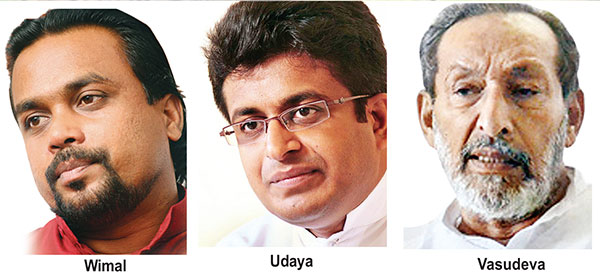
In spite of backing the rebel ministers’ cause against the Sri Lanka-US deal, the Sri Lanka Freedom Party (SLFP) conveniently skipped an opportunity to join the Supreme Court action. The SLFP parliamentary group consists of 14 members. The second biggest constituent in the 145-member government Parliamentary Group, the SLFP owed an explanation why at least one of its ministers, out of the two, namely Nimal Siripala de Silva or Mahinda Amaraweera failed to join the rebellious colleagues, Vasudeva Nanayakkara, Wimal Weerawansa and Udaya Gammanpila, in their principled stand against the controversial deal. General Secretary of the SLFP Dayasiri Jayasekera, however, flayed Yugadanavi agreement at the launch of a high profile campaign, on Oct 29, at Solis Hall, Pitakotte.
In an interview with political weekly Anidda in its Dec 26, 2021 edition, lawmaker Jayasekera, having challenged the legality of the Yugadanavi deal, vowed not to allow the implementation of the energy project, under any circumstances. The SLFPer strongly rejected the stand taken by Chief Government Whip Johnston Fernando as regards the Yugadanavi agreement.
If the SLFP is sincere of its position vis-a-vis the US energy deal, former President Maithripala Sirisena, MP, should have given his party the go ahead to join the challenge in the Supreme Court. The SLFP’s participation in legal action would have certainly strengthened the case against the Cabinet of ministers. Anidda interviewer should have sought an explanation from lawmaker Jayasekera over the SLFP not being part of the real opposition to the Yugadanavi deal.
Veteran politician Vasudeva Nanayakkara recently referred to those who backed Yugadanavi, opposed it and then took a sort of neutral stand. Was he referring to the SLFP? In addition to the DLF, the NFF and the PHU that have challenged the Cabinet of ministers over the Yugadanavi deal, SLFP, Communist Party, LSSP, Yuthukama civil society and National List MP Tiran Alles have declared opposition to the same. Of the 225 lawmakers, approximately 25 elected and appointed on the SLPP National List are believed to be opposed in line with the decision taken by their respective parties. In addition to them, Ven. Athureliye Rathana, National List MP of Ape Jana Bala Pakshaya backs the campaign.
A govt. in turmoil
The Yugadanavi crisis is just one among a spate of issues gravely troubling the government. The cash-strapped regime sought to project the Yugadanavi deal as a success primarily on the basis it would please the ever antagonistic Washington and the US firm paying USD 250 mn in two installments. Those who support the project propagate the line or lie that the deal would make available electricity at a much cheaper rate. There had never been a previous agreement that ended up having a section of Cabinet ministers who represent the legislature moving Court against their colleagues. The issue should be examined taking into consideration that the President is the head of the Cabinet. Where does the President stand? Did the appearance of CEB Chairman M.C. Ferdinando at a special media briefing arranged by the Presidential Media Division (PMD) signifies the President’s stand? In case the Supreme Court ruling pertaining to Yugadanavi petitions goes against the government, what will it do? Is there a fallback position? What will become of the SLPP’s relationship with those who opposed the project?
The much-debated ‘One Country, One Law’ concept has caused controversy primarily due to the appointment of Ven. Galagodaatte Gnanasara Thera, the recipient of presidential pardon from previous President Sirisena, after his ruffian behaviour even in a court of law, as the head of the relevant Presidential Task Force. The handling of State Minister Ratwatte’s inexcusable behaviour at the Welikada and Anuradhapura prisons badly exposed the government.
The government will have to address a series of other issues with the daunting challenge in servicing foreign and local debt as well as ruination of the Maha crop as a result of the hasty ban on agro-chemicals. The sacking of Agriculture Secretary Senior Prof. Udith J. Jayasinghe has prompted the angry official to fire a broadside at the government. The government appeared to have been sort of surprised by Prof. Jasasinghe’s response. The SJB has lambasted Prof. Jayasinghe and held him and the SLPP political leadership responsible for the crisis whereas the former now portrayed himself as the one who represented the interests of the public.
The government cannot depend on its overwhelming parliamentary majority to overcome the crises. Actually, the near 2/3 majority does not mean a thing as the government continues to weaken itself by utterly misplaced strategies. The SLPP is in such a desperate situation, the situation cannot be overcome or public attention diverted by propaganda on mainstream or social media.
Midweek Review
How Prof. Dewasiri’s FB post brought about Speaker Ranwala’s exit
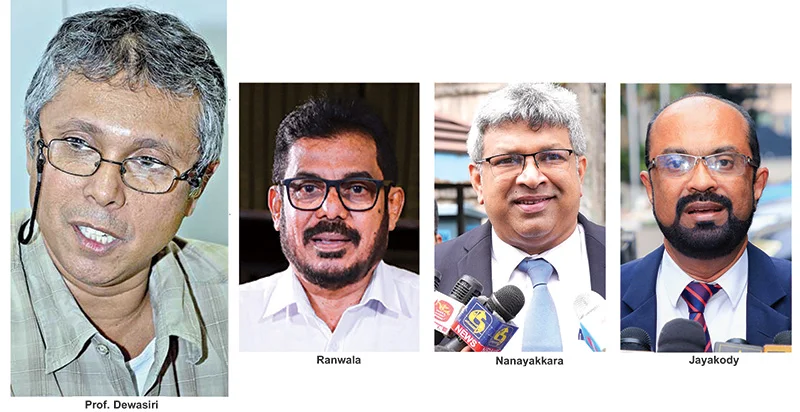
By Shamindra Ferdinando
Prof. Nirmal Ranjith Dewasiri was the first to question the National People’s Power government over Speaker ‘Dr.’ Asoka Sapumal Ranwala regarding his academic qualifications.
Dewasiri’s shock query caught the NPP by surprise. The academic questioned the government on his social media account on 05 Dec. The Parliament unanimously appointed Ranwala as Speaker of the Tenth Parliament on 21 Nov.
Dewasiri demanded that the government compel Speaker Ranwala to resign in case the parliamentarian deliberately provided false information. If the Speaker declined to do so, appropriate measures should be taken to remove him, Prof. Dewasiri declared, while finding fault with the new entrant for (i) falsely claiming to have a degree and (ii) believe he could hold such an important position regardless of the deceit perpetrated by him.
Prof. Dewasiri emphasized that the second fault was far worse than the first. One-time spokesperson for the Federation of University Teachers Association (FUTA) and advocate of the Yahapalana administration warned the government of far reaching consequences as it was badly exposed.
The government obviously didn’t take Prof. Dewasiri’s social media post seriously. Perhaps the top leadership felt that the issue at hand wouldn’t attract much public attention. However, the Opposition, both in Parliament and outside, launched an all-out attack.
The SJB declared its intention to move a no-confidence motion against the Speaker. In spite of the NPP having an unprecedented 2/3 majority in Parliament, the ruling party feared to face the Opposition move. The NPP could have easily routed the combined Opposition in Parliament, but to defend an obvious wrongdoer would have ruined President Anura Kumara Dissanayake’s (AKD) parliamentary group as they came to power, less than three months ago, promising to correct all the shenanigans that had been going on in the country, under the guise of democracy, since independence.
Beleaguered AKD had no option but to ask Speaker Ranwala to step down. The NPP could have avoided a lot of flak if the party acted immediately after Prof. Dewasiri’s disclosure. If not for the intervention made by the academic and a vociferous critic of wrongs done by the previous regimes, particularly to academics, Ranwala would still have been the Speaker.
The utterly dispirited SJB wouldn’t have inquired into Ranwala’s credentials under any circumstances. Thanks to Prof. Dewasiri, the Opposition received a mega opportunity to question the very basis of the NPP’s presidential and parliamentary election campaigns.
The SJB and new Democratic Front (NDF) had been rejected by the electorate to such an extent, even if they challenged Ranwala over his educational qualifications, the people may have ignored the issue as the rantings of a frustrated Opposition still licking the wounds of their routing at the polls. Prof. Dewasiri’s disclosure obviously delivered a knockout blow to the government.
Ranwala resigned on 13 Dec., just over a week after Prof. Dewasiri’s bombshell revelation. It would be pertinent to mention that just before the announcemnt of the Speaker’s resignation, President AKD told government media bosses that he wouldn’t protect any wrongdoer.
Having asked the electorate to reject unscrupulous political parties that had ruined the country, the NPP couldn’t have risked its political project to save Ranwala, one-time President of the Ceylon Petroleum Common Workers’ Union, until he was sent on compulsory retirement in March 2023 by the then Minister of Power and Energy Kanchana Wijesekera. The Wickremesinghe-Rajapaksa government accused Ranwala of obstructing fuel distribution services.
The NPP couldn’t have been unaware of Ranwala’s bogus claim. If Ranwala deliberately deceived the NPP, he should be dealt with harshly. Perhaps Ranwala should be asked to resign his parliamentary seat forthwith for deceiving the whole country, to pave the way for the NPP to fill that Gampaha District vacancy thereafter. Having vowed to clean up Parliament, the NPP cannot, under any circumstances, protect any wrongdoer.
But, corrupt political parties shouldn’t think for a moment that they can capitalize on the Speaker’s issue. The people rejected the SJB, NDF and SLPP (Sri Lanka Podujana Peramuna) twice this year as they earned the wrath of the people. It would be a grave fault on their part if they believed Ranwala’s ouster could strengthen their campaign against the government.
The NPP should, without delay, set the record straight. The issue is whether Ranwala deceived the NPP with regard to his doctorate, or the party knew all along that their CPC trade unionist didn’t have the academic qualification which he proudly flaunted.
House tricked
Premier Dr. Harini Amarasuriya and Foreign Minister Vijitha Herath, together, accompanied Ranwela to the Speaker’s chair. The Opposition accepted the appointment. The Premier proposed Ranwala, while Minister Herath seconded that proposal.
Premier Amarasuriya, Opposition Leader Sajith Premadasa, and Leader of the Sri Lanka Muslim Congress Rauff Hakeem congratulated National Executive Committee member Ranwala on that occasion.
One-time member of the Biyagama Local government body, Ranwala twice represented the JVP in the Western Provincial Council. According to Parliament website, Ranwala holds a degree in Chemical Engineering from the University of Moratuwa and a doctorate in Biochemistry from Waseda University, Japan.
To make matters worse for the NPP, the Opposition challenged Deputy Speaker Dr. Rizvie Salih’s specialist tag. Salih answered his critics. His FB post explained his nearly 40-year career, with 12 years with the public sector, though he is not a specialist.
The Deputy Speaker told Parliament, on Tuesday, that he is not a specialist and never used the title in his official letterheads, visiting cards and prescriptions. ” I have categorically told that I should not be called a specialist in propaganda material during elections,” he said. In other words, he had found fault with those who handled the propaganda campaign for the NPP
Interested parties also challenged the doctorate of Justice Minister Harshana Nanayakkara, another first time entrant to Parliament.
The controversy over Nanayakkara’s doctorate took an unexpected turn when the Parliament claimed that the doctorate had been inadvertently mentioned by Parliament. Let me reproduce the clarification issued by M. Jayalath Perera, Director Legislative Services / Director Communication (Acting), Parliament: Clarification Regarding the Title of “Dr.” mentioned before the name of the Minister of Justice, Attorney-at-Law, Hon. Harshana Nanayakkara, on the Parliament website.
“I would like to emphasize the following points in relation to reports published in the media regarding the title of ‘’Dr.’’ mentioned before the name of the Minister of Justice and National Integration, Attorney-at-Law, Harshana Nanayakkara, in the directory of Members of Parliament on the Parliament website.
“It is important to note that Hon. Harshana Nanayakkara has not indicated holding a doctoral degree in the information provided to Parliament. The appearance of the title “Dr.” before the Minister’s name was a result of an error in entering the relevant data. Accordingly, steps have been taken to rectify this mistake.
“I express my deepest regret for the inconvenience caused to the Minister of Justice and National Integration, Attorney-at-Law, Hon. Harshana Nanayakkara, in this regard.
“Also, the process of re-checking and updating the information of all Members of Parliament on the Parliament website is currently underway.”
But those who cannot stomach the NPP’s victory ask why didn’t Nanayakkara get that corrected himself if he was not entitled to be called “Dr.”? However, the Justice Minister lodged a complaint with the CID on Monday (16). The investigation can help ascertain whether some interested party conspired to discredit the NPP.
That clarification issued by Parliament meant that Ranwala provided false information to Parliament. According to Jayalath Perera, the parliamentary staff entered the relevant data provided by lawmakers, hence the only mistake on their part pertained to the Justice Minister’s data.
Power Minister Kumara Jayakody, too, lodged a complaint with police seeking an investigation into what he called an organized attempt to discredit him by challenging his academic qualifications. Both Nanayakkara and Jayakody speculated about the possibility of those who had been rejected by the people and their associates and supporters being involved in the high profile campaign.
The NPP cannot afford to disappoint 5.7 mn people who voted for AKD at the presidential election and 6.8 mn at the general election. The NPP increased its voter tally from 5.7 mn to 6.8 mn within a couple of weeks whereas the SJB was reduced to 1.9 mn votes from 4.3 mn at the presidential poll. The NDF was reduced to just 500,000 votes from 2.2mn at the presidential election while the SLPP increased its tally from 340,000 to 350,000. The Opposition is in disarray and in a pathetic situation.
Ranwala’s fiasco has sort of given the Opposition false hopes of a quick comeback. The forthcoming local government polls will show the ground situation. The NPP must keep in mind that in addition to the Ranwala affair, the failure on its part to provide sufficient relief to fuel and electricity consumers as promised has caused much public anger. Having repeatedly alleged that the previous government couldn’t substantially reduce fuel prices as the then Minister Kanchana Wijesekera pocketed the money, and having made those claims against the previous Minister in charge of the subject, the NPP brought down the price of a litre of Octane 92 by just 2 rupees much to the public’s resentment.
The pathetic handling of the rice mafia, too, didn’t do the NPP any good. Throughout the polls campaigns, the NPP repeatedly assured that the rice mafia would be appropriately dealt with and prices brought down and stabilized. The NPP also promised that rice wouldn’t be imported at all though imports would meet the tourist sector requirement. That much touted promise, too, was broken. However, the electorate, the writer is certain, doesn’t see any point in once again pinning their hopes on the utterly corrupt and dishonest lot rejected at the presidential and parliamentary polls.
Why Parliament shouldn’t defend wrongdoers
During the general election campaign, AKD explained why Parliament shouldn’t protect wrongdoers. The President said that the Yahapalana Parliament (2015-2019), during Karu Jayasuriya’s tenure as the Speaker, defeated a no-confidence motion moved against Ravi Karunanayake over the Treasury bond scams, especially after he told the Presidential Commission of Inquiry that probed it, he could not remember the person who gave him a luxury penthouse at Kollupitiya. Then in 2023 the Wickremesinghe-Rajapaksa government defended Keheliya Rambukwella when a no-faith motion was moved against him over corruption in the health sector procurement, the President said.
Having said so, AKD couldn’t have defended Ranwala in case the SJB handed over a no-confidence motion against him. In fact, the NPP has created an environment that may prevent those exercising political power from coming to the rescue of wrongdoers under any circumstances.
During Ranwala’s very short stint as the Speaker, he had the opportunity to receive several foreign dignitaries. Press releases issued by Parliament following those meetings referred to Ranwala as Dr. Ranwala.
South Korean Ambassador Miyon Lee paid a courtesy call on Speaker Ranwala on 04 Dec. at the Parliament complex. Secretary General of the Parliament Mrs. Kushani Rohanadeera, was also present on the occasion. This happened the day before Prof. Dewasiri exposed the NPP parliamentarian.
Ranwala, not aware of what was coming, addressed the newly elected members on 25 Nov., in Parliament, where he emphasized the responsibility on the part of newcomers (he, too, was a newcomer struggling to handle responsibilities for want of parliamentary experience) to familiarize with parliamentary procedures. Speaker Ranwala said that public expectations couldn’t be met unless they learnt about parliamentary procedures. Ranwala was addressing the inaugural session of the orientation programme for lawmakers.
The Parliament website quoted Speaker Ranwala as having emphasized the importance of organizing such workshops, noting that a thorough understanding of parliamentary traditions, constitutional frameworks, standing orders, and related parliamentary procedures is crucial for serving the people through the diverse debates conducted within Parliament.
Chinese Ambassador in Colombo Ambassador Qi Zhenhong was the first envoy to pay a courtesy call on Ranwala at the Parliament. The Chinese Ambassador conveyed the greetings of the Chairman of the Standing Committee of the National People’s Congress of the People’s Republic of China (Speaker of the Parliament of the People’s Republic of China) Zhao Leji, to the newly elected Speaker of the Tenth Parliament during the meeting.
The Chinese envoy was followed by Indian High Commissioner Santosh Jha. Jha paid a courtesy call on the Speaker on 28 Nov. at the Parliament.
The United Nations Resident Coordinator in Sri Lanka, Marc-André Franche, met Speaker Ranwala on 04 Dec.
In the wake of Prof. Dewasiri’s shocking disclosure, Speaker Ranwala received a high-level US delegation led by Assistant Secretary of State for the Bureau of South and Central Asian Affairs Donald Lu. The meeting took place on 06 Dec.
The delegation included Ms. Anjali Kaur, Deputy Assistant Administrator of the Bureau for Asia at USAID, and Mr. Robert Kaproth, Deputy Assistant Secretary for Asia at the US Department of the Treasury.
According to a press release issued by Parliament the meeting focused on Sri Lanka’s reform priorities and the critical role of the House in advancing the people’s mandate for accountability, transparency, and inclusive governance.
Ambassador of the United Arab Emirates to Sri Lanka Khaled Nasser AlAmeri was the next to pay a courtesy call on Speaker Ranwala. That meeting took place on 09 Dec. amidst a stepped-up campaign against Speaker Ranwala. The NPP seems to have operated on the premise that the controversy over the Speaker’s credentials would gradually fade away. But, the media pressed the Cabinet spokesperson Dr. Nalinda Jayatissa over the simmering serious issue. That controversy sort of overwhelmed the NPP that worked so hard to portray all other political parties, other than them, as corrupt to the core.
In fact, the NPP had nothing else but to depend on what it called a new clean political culture. Having impressed the electorate with nothing but promises and assurances that it would do the right thing, it couldn’t have a blatant liar as the Speaker.
If not for the political culture that had been introduced by the NPP, in the wake of Aragalaya in 2022, the false declaration made by Ranwala wouldn’t have been an issue at all. The people would have simply accepted it as just another lie. Our inefficient and useless Parliament had been so disgraceful in its conduct and encouraged public resentment that a Speaker’s false claim wouldn’t have caused a public furore.
The NPP’s failed bid to storm Parliament during the final push against President Gotabaya Rajapaksa should be examined taking into consideration the pathetic state of our Parliament. Some of those unscrupulous men who represented Parliament over the past two to three decades brought about the Parliament’s collapse. Instead of taking remedial measures, political parties allowed the deterioration to continue, unabated. Nothing can be as ridiculous as conducting student parliaments all over the provinces. What the Parliament really expected to achieve by promoting student parliaments at a time the very basis of the parliamentary system is under threat due to overall failure of the political party system.
Parliament must take appropriate measures to restore public confidence in the highest institution in the country. Ranwala’s affair proved beyond doubt that the Speaker, who is also the Chairman of the Constitutional Council, could manipulate the system. No one and no political party should be above the law. War-winning Sri Lanka had suffered unbearable losses for want of proper parliamentary control over public finance over the years.
Let us hope the NPP has learnt a hard lesson at the onset of AKD’s five-year term that would help the party to navigate choppy waters. The daunting challenges faced by a bankrupt country should prompt all political parties, represented in Parliament, to reach consensus on Sri Lanka’s response to the deal with the IMF, signed by Ranil Wickremesinghe. The issue the Parliament must grapple with is how to transform the sick national economy to make it possible for us to start repaying foreign debt in 2028 without making most of us absolute paupers, but many Lankans are already in dire straits economically.
The Parliament can begin by making the Supreme Court judgment on the economic crisis that led to Gotabaya Rajapaksa’s removal available to new members of Parliament. Of the 225 MPs, 162 are new entrants. The Supreme Court in Nov. 2023 issued a symbolic ruling that Rajapaksa brothers – including two ex-Presidents – were guilty of triggering the worst financial crisis by mishandling the economy.
In a majority verdict on multiple petitions filed by academics and civil rights activists, a five-judge bench of the Supreme Court ruled that the respondents, who all later resigned or were sacked, had violated public trust. But that verdict should be examined along with massive foreign loans taken by the Yahapalana government during the 2015-2019 period at high interests that contributed massively to the crisis.
Let there be no holds barred examination of the economic crisis and exposure of all responsible, regardless of their status. However, that wouldn’t be a reality unless the legislature fulfils its basic obligations in terms of the Constitution.
Let us also not lose sight of hidden hands, especially from the West who make matters worse through their cloak and dagger operations worldwide as also was put into operation here during Gotabaya Rajapaksa presidency, like even cutting off worker remittances from our banking system thereby we couldn’t even scrape together a few million dollars to clear even a shipment of cooking gas. They have done similar jugglery to so many other countries, even in our neighbourhood, as has been the case already in Bangladesh and Pakistan. Modi should not feel all that smug as we do not know what plots are being hatched against him.
Remember the uncompromising Aragalaya activists who were threatening to die for a system change in the country, but disappeared into thin air no sooner Ranil Wickremesimnghe was installed in the seat of power with the ouster of Gotabaya Rajapaksa by extra parliamentary means.
Midweek Review
Seeking cultural transmission between bodies
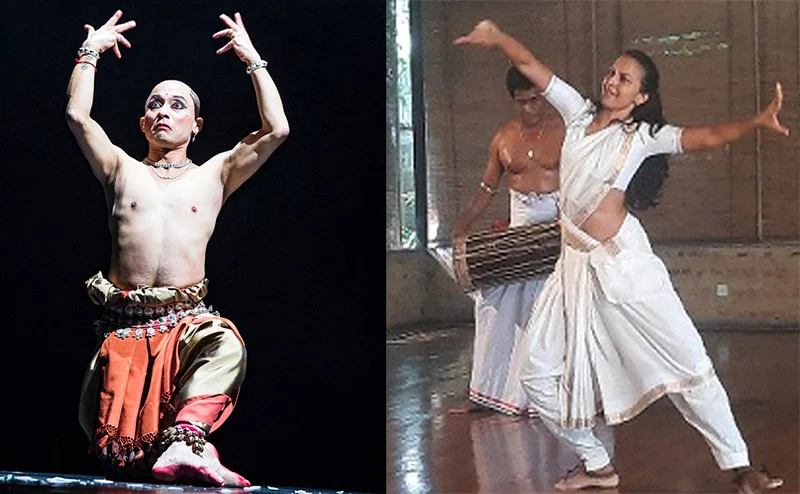
From Chitrasena to Akram Khan:
by Saumya Liyanage
Akram Khan is a world-renowned dancer, choreographer and the founder of Akram Khan Company (AKC) in the UK. He has been an impactful dancer and choreographer who was initially trained as a Kathak dancer during his apprenticeship under various Kathak Gurus in Asia and elsewhere. He and his dance company have created numerous dance productions that surpass the traditional boundaries. Akram Khan is a recipient of top awards including two Laurence Olivier Awards, the Bessie Award (New York Dance and Performance Award), the prestigious ISPA (International Society for the Performing Arts) Distinguished Artist Award, the Fred and Adele Astaire Award, the Herald Archangel Award at the Edinburgh International Festival, the South Bank Sky Arts Award, and ten Critics’ Circle National Dance Awards for his company.
With the initiative of the British Council in Colombo, the Akram Khan Dance Company contacted me a few months ago. The Legacy International Project Manager of the AKC, Varsha Kumar sent me an email informing me of an exciting project the dance company wanted to initiate in Jaffna. It was an upcoming collaboration between Akram Khan Company supported by the British Council Colombo to conduct an intense dance exchange workshop. This initiative facilitated a five-day intensive cultural transmission of Bharatanatyam dance conducted by Mavin Khoo, the artistic associate of the Akram Khan Company with a selected group of youth from Jaffna.
The idea was to continue and sustain the traditional dance forms and explore how they could be sustained and continued further through innovative practices. Mavin Khoo visited Jaffna for the first time to initiate this cultural transmission project with the hope of conducting this intense workshop on Bharatanatyam. Mavin Khoo, trained as a traditional dancer in Bharatanatyam in Malaysia, is a choreographer and the creative collaborator of Akram Khan. Mavin holds an MA in Choreography from Middlesex University and was a faculty member of the Dance Studies Department, School of Performing Arts at the University of Malta in 2014. He has been working as the rehearsal director of the Akram Khan Company and is exploring traditional dance and its contemporary relevance as a mode of human agency and provocation.
It is an ongoing work that the AKC initiated and this collaboration will continue further in future. Here is something interesting about what happened when Khoo, Varsha and their team came to Colombo after finishing the Jaffna Classical Intensive project. The British council director Edward Orlando invited me to a networking lunch in Colombo, where Khoo and Varsha were present. At lunch, I met some of the Sri Lankan dance community representatives. They included versatile dancers such as Upeka Chitrasena, Heshma Wignaraja, and Kapila Palihawadana. We shared our thoughts and ideas about dance and future collaborations during lunch. After this session, Upeka Chitrasena invited us to visit Chitrasena Dance Company. Akram Khan Company focused on helping peripheral dance groups to sustain and continue their traditional dance heritage and encouraged them to expand their possibilities of innovations, and the Chitrasena Dance Company in Colombo is also dedicated to preserving and continuing Sri Lankan traditional dance practices for posterity.
Dance as Ekstasis
- Chitrasena (1921-2005)
- Akram Khan
I am not a dancer, but I have been interested in dance and dance theatre throughout my academic career. Dance and theatre share many elements and it is the body that is central to the dancer and actor’s work. A few days ago, at the Faculty of Medicine, a session was conducted by the Centre for Meditation Research on how movement facilitates happiness and wellbeing. With my research collaborators, Kanchana Malshani and Chamanee Darshika, I demonstrated how movement is central to our understanding of the self and the world. The key question that I posed at the seminar is that movement allows us to understand our body, time and space and allows us to understand how we could connect with other bodies. Movement is the primal element of the body of the animated being.
What fascinates me here is that actor/dancer experiences time and space and the Other, in a different way than we experience the same phenomena on the daily basis. Dance scholar and Philosopher Sheets Maxine-Johnston argues that Man comprises temporality within himself, for he is such an ekstatic being. He is always at a distance of himself, always in flight” (Sheets-Johnston, 2015, pp. 16-17). This statement clearly indicates how the dance and dance experience override the objective time and space. Greek etymology of the word ekstatic means how one emancipates from her/his own self and transcends for the daily reality. In this sense, the moving body of the dancer, as I witnessed at the Chitrasena Dance Company, shows that dancers’ “being” is not in the daily reality when they intensely move their bodies in the space and time with the complex drum ensemble. Hence, I argue that our understanding about time and space is constructed through the physiological and mathematical understanding of time and space. The other is understood in a way that we as selves are constructed and defined through various lingual and cultural discourses. In this sense, the dancer/actor surpasses these constructed boundaries when the body becomes animated through dance and acting.
We sat at the Chitrasena Dance Company in the afternoon of Dec., 14 2024, and Khoo and Varsha were scheduled to leave Colombo a few hours later. An intense and galvanising performance was unveiled at the bare stage of Chitrasena Dance Company with Thaji Dias and the dance ensemble with seven master drum players. One after the other, a series of traditional dance repertoires unfolded before our eyes. Particularly Thaji Dias’ mesmerising and electrifying bodily motility of Kandyan, Low Country and Sabaragamuwa styles blended with intense rigor and precision. It was evident that some of the dance repertoires that Thaji and the lead male dancer performed were somewhat improvisational, bringing key elements of Kandyan dance into an ecstasy of performance. Both dancers seemed to be connected with each other through somatic means, communicating with facial and bodily gestures to trigger certain dance repertoire to perform together. I witnessed that both dancers were kinesthetically and sensorially joined through learned repertoires to perform a new interpretation of Kandyan dance form.
Cultural Transmission
These traditional dance performances triggered several important questions related to the dance body and cultural transmission of somatic knowledge. First, when Heshma, the artistic director and choreographer of Chitrasena Dance Company introduced a particular dance repertoire developed and choreographed by Vajira Chitrasena, she articulated this as a cultural transmission of choreographic knowledge which came through two generations of dancers. This statement triggered several important questions related to dance historiography. When Chitrasena and Vajira choreographed their works, it may have been done through the embodied knowledge that they possessed through what they learnt and mastered from the traditional Gurus. However, Chitrasena and Vijira may have understood that replicating traditional dance and its repertoire would not add any innovation to their dance interventions. My interest was drawn to this phenomenon and the question emerged on how these individual dance artists have distilled the traditional Kandyan dance to modernist choreographic works through adding innovative elements to their newly founded body notations.
Researchers who are working on the intangible cultural heritage mainly focus on how traditional dance and heritage can be transmitted. They are mainly concerned about how these traditions are continued and sustained through contemporary dance ensembles. However, the intangible heritage discourse has least focused on how these dance traditions have been changing through time and how these new elemental changes have been transformed and transmitted to the next generation of dancers. During our encounters with dance choreographer and artistic director of Chitrasena Dance Company, Heshma discussed how they “do” dance. Her articulation of “doing” dance rather than talking about dance explains how they transmit knowledge of somatic elements of dance through bodies. She said, “We rarely talk … we do not use language but we do dance”. One of the challenges posed by these issues is that the corporeal learning and embodied knowledge cannot be objectified in the researcher’s eyes. They are somatically embedded in the dancers’ bodies and are sedimented within their dance repertoires. A meticulous observation, analysis and categorisation will be required for someone to understand and identify how these dance elements have been changed and embedded in the dancer’s body. As I believe, new dance ethnographic research would be useful for researchers to extricate those elemental dance repertoires to understand how contemporary dancers’ bodies embody dance heritage in their somatic memories.
Conclusion
Akram Khan and his creative associate Mavin Khoo explore the possibilities of preserving traditional dance forms while seeking opportunities to revive them through innovative practices. The Chitrasena Dance Company working in the field of traditional Sri Lankan dance ambitiously is in search of a new era of Sri Lankan dance while passing the Chitrasena -Vajira dance heritage to the next generation of dancers and choreographers. Both companies share similar objectives in dance preservation and innovations within the highly contested Global cultural domains. Khan, Khoo, Chitrasena, Vajira, Thaji and other dancers embody a vast knowledge of somatic practices akin to their own dance traditions. Yet, these ekstatic bodies transcend the daily constructed selves, which carry the somatic knowledge of dance that are waiting to be disseminated in the bodies of the next generation of dancers. These areas of dance-ethnography should be further developed to understand the embodied knowledge and the somatic practices infiltrated through the generations of dancers and drummers. New dance-ethnography, dance historiography and new methodologies should be developed and applied to deepen our understanding of dance as an explicit knowledge of human expressions, emotions and ecstasy.
References
Sheets-Johnston, M. (2015). The phenomenology of dance. Philadelphia (Pensilvania, Estados Unidos) Temple University Press.
Company, Akram Khan. n.d. “Our Biographies.” Akram Khan Company. Cog. Accessed 2024. https://www.akramkhancompany.net/about-us/our-biographies/.
Company, Akram Khan. n.d. “Our Biographies.” Akram Khan Company. Cog. Accessed 2024. https://www.akramkhancompany.net/about-us/our-biographies/.
Nürnberger, Marianne. 2014. “Vajira – the First Professional Female Dancer of the Sinhalese Style.” Sri Lanka Journal of Humanities 40 (0): 99. https://doi.org/10.4038/sljh.v40i0.7232.
Raheem, Mirak. 2022. “Vajira: The Pioneering Female Dancer.” South Asian Dance Intersections 1 (1). https://doi.org/10.55370/sadi.v1i1.1475.
–––
Saumya Liyanage is an actor and professor in Drama and Theatre, currently working at the Department of Theatre Ballet and Modern Dance, Faculty of Dance and Drama, University of Visual and Performing Arts, Colombo, Sri Lanka. saumya.l@vpa.ac.lk
The author wishes to thank Himansi Dehigama for her assistance in preparing this article.
Midweek Review
Motherhood Triumphs

By Lynn Ockersz
Out of war’s destructive wastes,
And piles of mortal remains,
There emerge buds of promise,
Hardly into their teenage years,
That radiate childhood innocence,
And a motherhood of selflessness,
That would give fragile humans,
Their only security guarantee,
In a life rifled with uncertainties.
-

 Opinion7 days ago
Opinion7 days agoDegree is not a title!
-
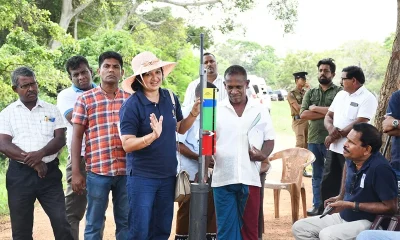
 News6 days ago
News6 days agoInnovative water management techniques revolutionising paddy cultivation in Lanka
-
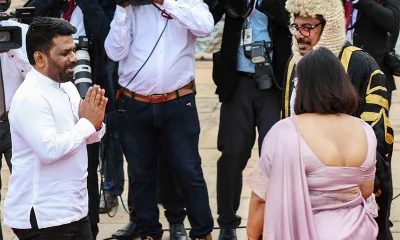
 Features5 days ago
Features5 days agoThe Degree Circus
-

 Editorial7 days ago
Editorial7 days ago‘Compass’ under the microscope
-
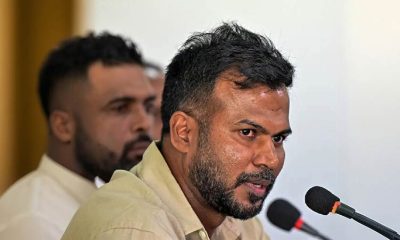
 Sports3 days ago
Sports3 days agoSri Lanka to mend fences with veterans
-
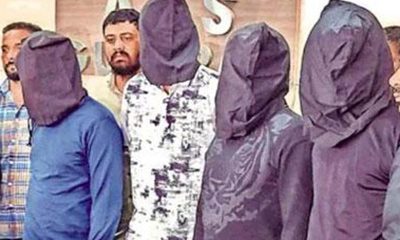
 News7 days ago
News7 days agoArrest of Lankans on terrorism charges in Gujarat: Muslim grouping renews campaign for their release
-

 Opinion5 days ago
Opinion5 days agoHas ‘Compass’ lost direction?
-

 Editorial6 days ago
Editorial6 days agoA supreme irony


